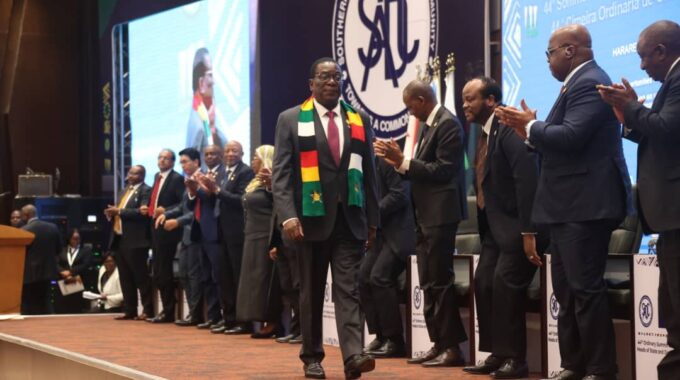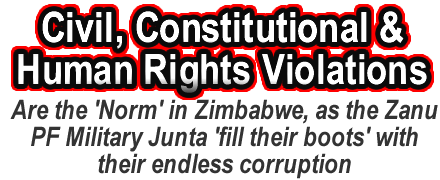 nehandaradio.com - 15th July 2025 - Zanu PF Leading Prepetration of Intimidation
nehandaradio.com - 15th July 2025 - Zanu PF Leading Prepetration of Intimidation
{{Source: www.zimrights.org.zw However being blocked by Firewall}} Also (see below - in italics) reinforced by Human Rights Watch
In 2024, Zimbabwean authorities acted to undermine democratic processes, repressed civil society and restricted political pluralism. They continued to weaponize the criminal justice system against perceived critics and the political opposition. Impunity for the ruling party ZANU-PF violence, intimidation, harassment, and repression against opposition members and civil society activists restricted civic and political space.
The authorities failed to uphold the government’s domestic and international human rights obligations to respect peaceful activism.
Intensified Crackdown on Government Critics
Ahead of the August 17 Southern African Development Community (SADC) heads of state summit in Zimbabwe’s capital, Harare, the authorities intensified the crackdown on opposition members and civil society activists. Security forces arrested more than 160 people, including a religious leader, elected parliament and council officials, political activists, union leaders, students, and journalists.
Human Rights Watch
Nehandaradio Report
Zanu-PF identified as leading perpetrator of human rights violations in Zimbabwe
HARARE – The ruling Zanu-PF party has been identified as the leading perpetrator of human rights violations across Zimbabwe last year, according to a report released by the Zimbabwe Human Rights Association (ZimRights) on Tuesday.
The 2024 Annual Report, titled “RISING STILL: COMMUNITY RESILIENCE IN THE STRUGGLE FOR HUMAN RIGHTS IN ZIMBABWE,” has indicated that members of Zanu-PF were responsible for the highest number of documented human rights violations in 2024. According to the report, ZimRights documented 274 human rights violations affecting a total of 8,279 people in 2024. Of these, 4,457 were females and 3,822 were males.
Harare and Bulawayo provinces consistently reported the highest numbers of affected individuals for both genders, suggesting a concentration of violations in these urban centers, potentially linked to political tensions and socio-economic instability. The report identified members of Zanu-PF as perpetrators in 1,359 violations. This figure positions them as the leading group implicated in human rights abuses, followed by local government officials and police forces.
The report also highlighted a troubling trend with 4,697 instances of Zimbabwe Republic Police (ZRP) violations.
The report also detailed various types of violations, with “restricted access to social services” being the most prevalent, affecting 4,687 individuals. “Displacement” affected 1,232 individuals, reflecting ongoing challenges related to political upheaval and land disputes. “Inhuman treatment” was reported for 531 individuals. ZimRights’ data further suggested a correlation between political affiliation and the likelihood of experiencing human rights violations, indicating a “politicisation of basic rights and services.”
This, the report argued, created an environment where people’s livelihoods could be contingent upon their alignment with the ruling party, undermining democratic principles and equity. In response to these findings, ZimRights actively engaged in rapid response initiatives, providing support to flood victims, evicted persons, and individuals affected by arbitrary arrests. The organisation also conducted 52 human rights clinics, offering free legal aid and support to vulnerable communities and victims of violations throughout 2024.
“…, as part of human rights monitoring and response action zone – we provided rapid response to Budiriro floods victims (25 families), Mufakose homeless persons who had been evicted (20 families), Mt. Darwin (12 families), Chinhoyi (60 families evicted from Citrus Farm), Gokwe (10 families affected by the floods), Chitungwiza, Epworth and Mabvuku (17) families affected by SADC (Southern African Development Community) arrests, 11 activists in Mutasa and Mutare, and 12 families in Kariba who were victims of arbitrary arrests,” the report noted.
